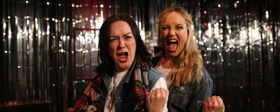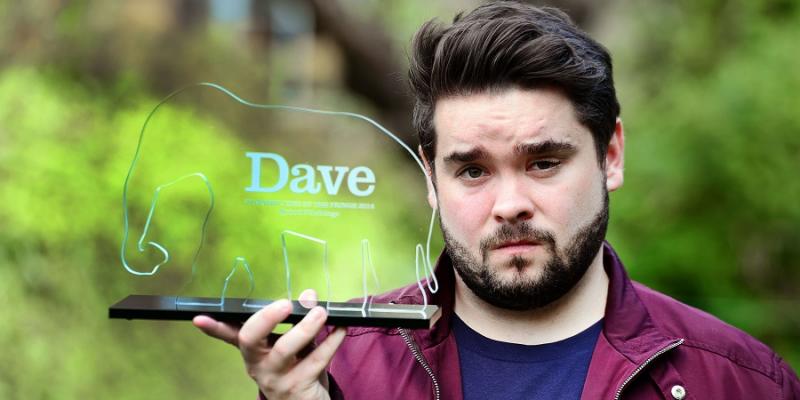No Laughing Matter: The Challenges of Reviewing Comedy

Reviewing a comic show can be a strange experience - if you're not laughing and everyone else is, how should you judge it? And does the very act of critiquing limit your potential enjoyment? BroadwayWorld reviewers share their thoughts!
Gary Naylor: Reviewing comedy is not easy. It's subjective, often requires knowledge of specific cultural norms and, lest we forget, is difficult to write and perform. And, in the theatre, it often starts from dead silence, with no warm-up, no compere, no booze even.
I recall going to the BBC's Television Centre in Shepherd's Bush to watch the recording of a new programme with some up-and-coming comedians, whom I vaguely recognised. Some of it worked, some of it didn't, and the audience response often needed a bit of boosting from the warm-up comic, Mark Lamarr. That was The Fast Show, one of the most beloved and well-respected sketch shows ever - not something I would have predicted 25 years ago!
That experience proved a useful benchmark in reviewing though, one that came to mind while I watched Shang-a-Lang, Catherine Johnson's musical before the musical that hit as big as big can get - Mamma Mia!. In the King's Head in 2014, I had literally no idea what people were laughing at - but they were, or some of them were. I squared the circle to some extent in the review.
All of which leads to the vexed issue of gender-based responses to comedy. Do men and women find different things funny? I can't think of a reason why that should be so, but observation suggests that, to some extent, they do. It is bias that, as a reviewer, one has to be (perhaps) more mindful of than any other.
Tim Wright: Comedy is a tricky one. I think it's helpful to take into account the wider audience reaction. If everyone is laughing except you, it's best to consider thoughtfully why that is. Don't be lazy, though - I've read reviews which have claimed people were "rolling in the aisles with laughter", when I've observed little more than a slight chuckle.
But great stand-up, like theatre, can be appreciated even if it's not your thing. A well-constructed joke or connected material can be praised even if it doesn't make you laugh.
Fiona Scott: People often think of me as a prude when it comes to comedy. Personally, my flavour of funny doesn't rely on smut and swearing, which I know is quite hard to come by! I enjoy a show that's well-crafted and has a nice narrative/theme running through it, which I would apply to critique any form of storytelling that's put in front of me.
I try to listen to the audience around me, as I would if I was at a play. Are they laughing? Are they crying? What remarks are they making at the interval/afterwards? This helps me make sure I'm on the same page as most people in the room when writing my review.
Because musicals and plays are my bread and butter and I feel more informed about them as a musician/writer, I tend to go for those gigs over shows I have less knowledge about, such as comedy or dance. I've never written a stand-up routine, but I can imagine the huge amount of effort that goes into crafting a comedy show. When the subject matter of a stand-up routine is something that I can relate to, then I'm interested.
I do find it hard to switch off when watching something purely for pleasure, but one of the reasons I got into reviewing was because I felt I had something to say, so it's natural for me to form an opinion about any performance or show I'm at.

Aliya Al-Hassan: I find reviewing comedy pretty tricky, as it's often far more subjective than other mediums. There's always a personality to consider; just because you like someone's style, content and delivery doesn't mean that everyone else does. There is also something quite different about seeing a comedian live, rather than on a TV show. Sometimes, you just have to be there to get it.
Audience also matters hugely. I once saw Simon Amstell twice in three days, as he was doing a 'work-in-progress' set. One night the audience was loving everything he was saying and he flowed, with much genuinely funny ad-libbing.
The other night was a more hostile atmosphere, with a large group of people who had clearly come as the tickets were only £10, rather than because they actually liked him as a comedian. He coped with the heckling brilliantly, but the show was not as funny, as he was trying out more things to see what the reaction was and seemed to rush it.
Admittedly, a work-in-progress exists to try things out, but it showed that no matter what the content is, the audience for a particular show makes a big difference to the comedian and their comedy.
Louis Train: I get nervous when I don't find something funny, because it's possible the joke isn't for me. For a long time, a straight white man could go to a comedy show and expect jokes that resonated with his experience. Anything that didn't feel right was off the mark - and the comic wasn't likely to last. Now, comedy has become much more inclusive, and a part of that means some jokes aren't for some people.
So, if I don't find something funny, I worry - maybe it was funny, just not for me. If everyone else is laughing, I can't hold it against the comic. I encounter this a lot as a foreigner in the UK, because I understand maybe half of your references to pop culture and politics.
I don't find it too hard to write reviews, though, because there's always so much else to write about: what the comic talked about, their style... No one wants to read that a comedian "was really really funny" anyway.
Amy Hanson: One thing I think about when reviewing comedy is the difficulty of finding the balance between telling the reader enough about the show without vague, out-of-context "the bit with the fishing rod" type comments, and avoiding spoiling things or giving away punchlines.
It's a hard thing to juggle, and something I always worry about. I certainly find comedy more difficult to review from that point of view, and of course the subjective nature of a lot of comedy doesn't help.
Emma Watkins: I was a public panellist for the Edinburgh Comedy Awards in 2012. That experience taught me to be open-minded about comedy - it's not just the stand-ups that you see on TV, there's a whole world of sketch, character, improv, spoken word, poetry...
In the end, my favourite show came from a comedy genre I thought wasn't my bag at all (sketch) - not just because the show was genuinely funny, but because it was also so beautifully constructed.
I personally find anything with audience participation a bit terrifying. And lowest common denominator humour isn't my thing either - I like something with a bit more intelligence and thought behind it.
When reviewing? Comedy is so subjective that I think it's important to give the reader a general feel (e.g. broad subject matter, style) but without being too spoiler-y. That way, they should have enough information to know whether it's something that might be to their taste, or something they know to avoid.
So I think it's fine to say that a show isn't 'your thing', whilst hopefully reviewing in such a way that someone else can spot if it is theirs. And one golden rule for me is not to quote the 'funniest bit' in your review - you're not doing either the act or a potential audience member any favours by doing that!

Joke Of The Fringe 2018
Natalie O'Donoghue: Every year, a list of the top jokes from the Edinburgh Festival is released and, to be honest, most of them don't sit that well out of context. You don't want to give away direct lines, but you do need to convey what kind of comedy it is - whether it be satire, political, sketch, improv etc.
As comedy is so subjective, I feel like it would be unfair to say that something "isn't funny" if the rest of the room is in creases. I have absolutely no problem saying that sometimes I maybe just didn't understand the humour. Perhaps I'm just not the target audience for something I go and see, and if I think that then I'm definitely going to put it in my review.
Marianka Swain: I do feel more self-conscious about reviewing comedy; I tend to second guess or analyse my response, rather than trusting my initial instinct. If I'm not laughing and someone else is, why? What didn't work for me? Of course, that type of analysis can also kill a joke stone dead.
Being there as a reviewer means you're in less-than-ideal conditions to enjoy comedy: you're likely on your own, in work mode, sober, concentrating and judging, rather than with a group of friends, relaxed and eager to be entertained. And press nights are strange, heightened occasions, with a mix of stone-faced reviewers and friends/family/backers laughing too hard.
If I'm reviewing comedy, proper success isn't just having an OK night, with a few laughs, but encountering something original, cleverly constructed, surprising, thought-provoking and/or affecting - so that I've seen a show I'll really enjoy reflecting on, sharing and championing.
I do feel we should hold lazy material to account, just as we would in any other type of theatre, and retrograde, sexist gags should be called out - as should any other type of casual prejudice or nasty punching down. And I'm probably more partial to the meta or soul-searching variety, rather than 10-puns-a-minute.
However, I've made peace with the fact that some types of comedy are never going to be my favourite thing (like farce - Noises Off being the glorious exception). But if it's done well and brings others joy, I'm delighted to report that in a review, and privately hope the next one will have me in stitches.
What are your views on enjoying and/or reviewing comedy? Let us know on Twitter @BroadwayWorldUK
Reader Reviews

Videos

